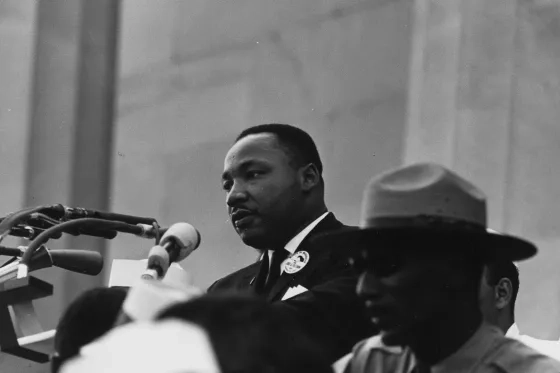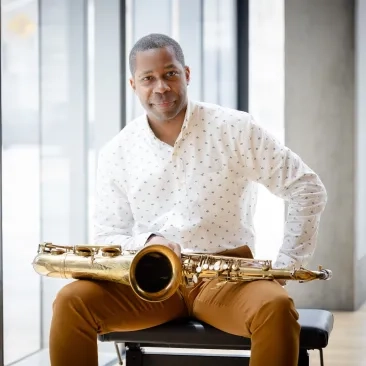Notes of Change: A Playlist Honoring Martin Luther King Jr.'s Legacy
SFCM's Roots, Jazz, and American Music Executive Director Jason Hainsworth curates a series of songs celebrating Dr. King and his transformative work.
Part of Dr. Martin Luther King Jr.'s incredible legacy is the inspiration he provided to the decades of musicians who lived and worked during and after King's lifetime. Honoring that in 2024, SFCM's Executive Director of Roots, Jazz, and American Music, Jason Hainsworth, has selected 15 songs that are inspired by or reflective of King's life and work. Protest songs and spirituals played a key part in the marches and protests that changed the nation decades ago.
Hainsworth's picks reflect the breadth of African-American music in the 20th—and 21st—centuries, where music plays a powerful role in stories about Martin Luther King Jr.’s incredible life as a civil leader. Hainsworth is also Associate Dean of Diversity, Equity, and Inclusion and Special Advisor to the President at SFCM.
Listen to them individually below or via SFCM on Apple Music.
Stevie Wonder, "Happy Birthday"
Written by Wonder as part of his efforts to codify King's birthday as a national holiday, "Happy Birthday" was released in 1981. A little over two years later, in 1983, President Ronald Reagan signed the holiday into law, and the song has since gone on to become a beloved standard in the Black community.
Herbie Hancock, "I Have A Dream"
Hancock, on a short list of the greatest jazz pianists of all time, composed "I Have a Dream" for his 1969 album The Prisoner, which was dedicated to King, who had been assassinated a year earlier.
Nina Simone, "Why (The King of Love is Dead)"
Simone was a towering voice in civil rights through the middle of the 20th century. "Why" stands along one of her most searing and famous compositions, "Mississippi Goddamn," in the pain and passion it expresses over King's assassination, and for good reason: "Why" was first performed just three days after King's death, on April 7, 1968, at the Westbury Music Fair in Long Island.
Public Enemy, "By The Time I Get to Arizona"
(Explicit lyrics and imagery)
Public Enemy's aggressive image and lyrics were as much of a shock to the system to mainstream America as their dense, groundbreaking production. The music video for "By the Time I Get to Arizona" was immediately controversial upon its release for the way the group literally took aim at short-serving Arizona Governor Evan Mecham, who canceled MLK Day in the state and turned it into an unpaid Sunday holiday.
Sam Cooke, "A Change Is Gonna Come"
Sam Cooke had already lived two musical lifetimes—first as a gospel superstar and then as a pop sensation—by the time he wrote "A Change Is Gonna Come." Cooke was inspired by a personal experience of racism and police abuse he suffered in Louisiana, as well as Bob Dylan's "Blowin' In the Wind," and he wound up crafting perhaps the definitive song of the civil rights era.
Dizzy Gillespie, "Brother K"
Though he cultivated a less glowering public image than his brother in bebop trumpet, Miles Davis, Dizzy Gillespie was a passionate civil rights activist, even running for president as a write-in candidate in 1964. In 1968, he changed the title of his composition “Exotica” to “Brother K,” responding to the assassinations of Martin Luther King, Jr., and Robert F. Kennedy that year.
Duke Ellington, "Martin Luther King" (Third movement of Three Black Kings)
Duke Ellington's musical tribute to his friend is made especially poignant by the fact that it was the last major work completed by the legendary composer, dictating to his son Mercer his final instructions before the work from his deathbed in 1974. A ballet to the piece was choreographed by Alvin Ailey two years later, and the piece remains in Ailey's American Dance Theater's repertoire.
Adolphus Hailstork, "Epitaph for a Man Who Dreamed"
Hailstork composed "Epitaph" in 1978 at the suggestion of William Henry Curry, who conducted the premiere of the work with the Baltimore Symphony Orchestra in 1980. The composer was one of many who studied with the legendary French pedagogue, Nadia Boulanger and is currently a professor and composer-in-residence at Old Dominion University in Norfolk, Virginia.
Duke Ellington, "Come Sunday (with Mahalia Jackson)"
Ellington wrote "Come Sunday" as part of his innovative extended suite "Black, Brown, and Beige," which he introduced at Carnegie Hall in 1943 as "a parallel to the history of the Negro in America." Fifteen years later, Ellington revisited the work, and "Come Sunday" became an a cappella showcase for Mahalia Jackson, known as "the Queen of gospel music." Jackson was close friends with King, and legend has it that she was the one who spurred him to discard the prewritten notes and go "off book," so to speak, for his "I Have a Dream" speech by spontaneously yelling, “Tell ‘em about the dream, Martin, tell ‘em about the dream!”
John Legend (featuring Common), "Glory"
Legend and Common wrote "Glory" for the 2014 film Selma, which portrays the 1965 Selma to Montgomery marches. (Common co-starred in the film as James Bevel, a minister and member of the Southern Christian Leadership Conference who was a major Civil Rights Movement leader.) The song won Best Original Song at the 87th Academy Awards and the 72nd Golden Globe Awards, as well as the award for Best Song Written for Visual Media at the 58th Annual Grammy Awards.
Greg Tardy, "Take My Hand Precious Lord"
Hainsworth chose Tardy's rendition of the perennial gospel standard "Take My Hand Precious Lord," which was King's favorite hymn. That Hainsworth and Tardy are both tenor players adds an extra meaning to the song, which was one of the last things King ever said. Exiting his room at the Lorraine Motel in Memphis, Tennessee on April 4, 1968, he shouted down from the balcony to Memphis tenor saxophonist Ben Branch—set to perform at a meeting with King later—“I want you to play 'Precious Lord' for me. Play it real pretty."
Donny Hathaway, "Someday We’ll All Be Free"
Although the lyrics to this song— which appeared on Hathaway's final album—were written by Edward Howard to reflect Hathaway's battle with mental illness, it was Aretha Franklin's live version, featured prominently at the end of Spike Lee's biographical film Malcolm X that added a new interpretation to its legacy.
Sounds of Blackness, "Optimistic"
Recorded by Optimistic for their debut album in 1991 and produced by Jimmy Jam and Terry Lewis, former members of Morris Day and the Time who produced extensively for Janet Jackson in the 1980s, "Optimistic" has become something of a standard, re-recorded by both rapper Jadakiss, who retitled it "Keep Your Head Up" and the supergroup August Greene (featuring Common and pianist Robert Glasper, with vocals by Brandy).
Lara Downes, "Troubled Water"
Downes, currently recording for Pentatone, the record label part of SFCM's family of companies, recorded Margaret Bonds' "Troubled Water" for her record Some of These Days. Bonds' best-known composition, "Troubled Water" was directly inspired by the spiritual "Wade in the Water," the lyrics of which, about the Israelites' Biblical flight from Egypt, attained new resonance during the Civil Rights era.
John Coltrane, "Alabama"
Not normally known as a political artist, Coltrane conceived of "Alabama" in response to the 16th Street Baptist Church bombing of September 1963 by the Ku Klux Klan in Birmingham that killed four young girls, but some have suggested that its melodic lines were inspired by the cadences of King's speeches.
Learn more about studying Roots, Jazz, and American Music at SFCM here.

